Textiles and Dress Designing - Clothing For Family Members Clothing for Newly Married | 12th Textiles and Dress Designing : Chapter 5 : Selection of Clothing and Clothing Care
Chapter: 12th Textiles and Dress Designing : Chapter 5 : Selection of Clothing and Clothing Care
Clothing For Family Members Clothing for Newly Married
Clothing For Family Members Clothing for Newly Married
Many of the newly married do not plan their post marriage
wardrobe. Their wardrobe should be a balance of western wear and ethnic wear
for various occasions. They should select clothes for different occasions. The
colours selected should enhance the colour of skin. The garments and accessories
selected should reflect their personality. Figure irregularities must be
considered.
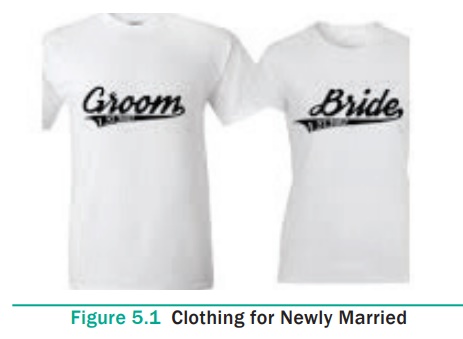
Clothing for Expecting Mothers (Maternity Wear)
Maternity clothes around the world have been undergoing
significant changes. There is greater demand for fashionable maternity clothes.
Nowadays pregnant women are no longer trying to hide their “Baby Bumps” instead
chooses to wear garments which fit their new shape often emphasizing the bust
and abdominal area. There are many brands which produce everyday wear for
pregnant women. As the body shape is changing the maternity clothing is made
with Lycra and elastic for stretch and growth.
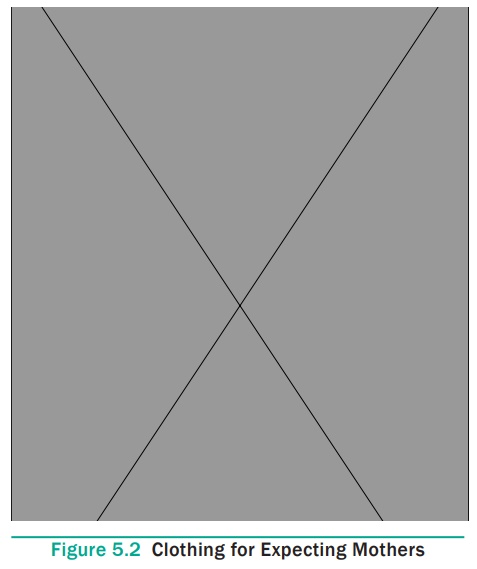
Clothing for Lactating Mothers
Lactating mothers can purchase readymade clothing which is plenty
in designs and styles to choose from. They need not buy special breast-feeding
clothes to breastfeed comfortably. A button down blouse can be quickly opened.
Dark colour fabrics should be selected that will hide any unexpected leaks much
better than light colours. Scarves and shawls are great accessories that can
cover leaks and provide privacy while breast feeding in public. Tight fitting
garments should be avoided. Variety of casual wear, formal wear and
professional outfits are available especially for breastfeeding moms in
maternity shops and online.
Right breastfeeding clothes will be very helpful to new mothers.
Breastfeeding fashion has come a long way. Nursing shirts and blouses are
available in different styles and colours. Nursing bras are must in wardrobe
for lactating mothers. A good nursing bra should be comfortable, fit well and
provide support for heavy milk filled breasts. It should be made from a
natural, breathable, absorbent fabric with soft cups.
Nursing sleepwear helps easy access to your breasts for night time
feedings. Breast feeding clothes have become much more stylish and women enjoy
wearing these garments.
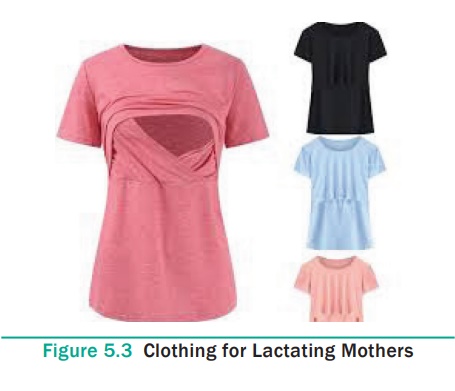
Clothing for Infant (8 to 9 Months)
The three “musts” in clothing the new born baby are warmth,
comfort and hygienic qualities. The new born baby will react to the variable
temperature of new environment. Babies heat up and cool off more quickly than
do grown-ups. The new baby is more subject to fever producing infections, many
of which can be transmitted by clothing if care is not exercised. During the
first few months of life, the baby will sleep 80 per cent of the time and must
have comfortable clothing for sleeping. The most suitable fibre for infants
clothing is cotton, because it is soft and can be kept hygienically safe by
washing in extremely hot or boiling water.
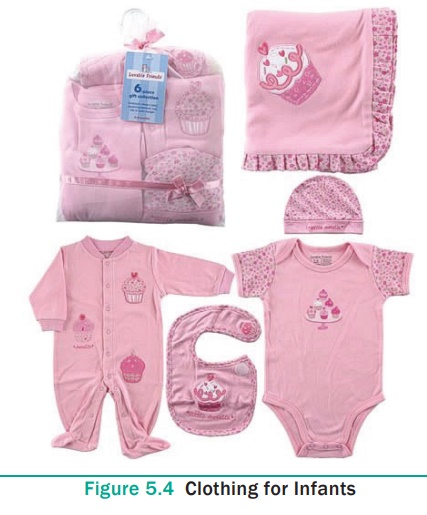
Clothing for Creeper (8 Months to 1 Year)
More clothes are required when the baby begins to creep. Overalls
are the simplest form of garment for both sexes especially those with snaps in
the crotch help easy change of diapers. Strong and durable fabrics are suitable
for this age group. They crawl on the floor; fabrics from knees wear off due to
friction. Garments with adjustable straps are more suitable due to growing
stage.
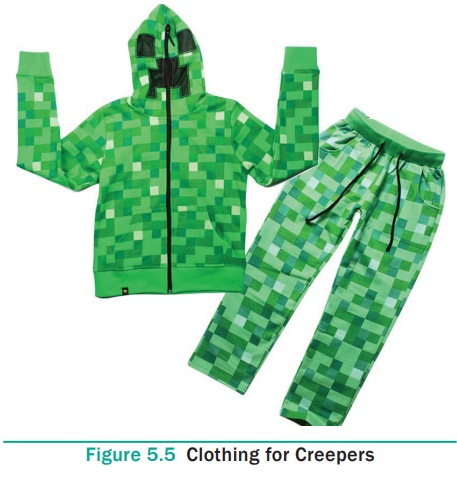
Clothing for the Toddler (1 to 2 Years)
The toddler needs clothing that provides maximum freedom for all
the activities usual at this stage. Overalls are preferred. One piece garments
with gripper openings at the legs or crotch are commonly worn by toddlers,
although one-piece clothing is soon outgrown because of the rapid growth in
this period. During creeping and toddling years, one piece pyjamas are usually
safer and neater than two-piece ones. Pyjamas should be made of soft washable
materials.
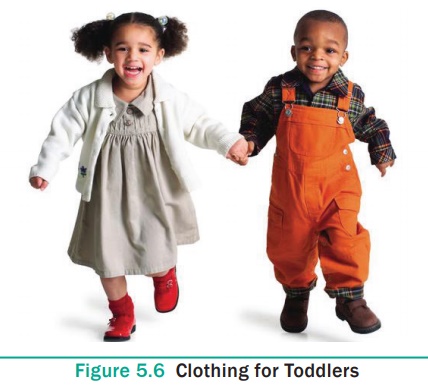
Clothing for the Pre-School Child (2 to 4 Years)
Clothing for the pre-school age child may be a major problem for
the family because it is expensive and used only for a short time. Clothing
should be selected to help the child develop self-reliance, practice social
skills and interact with peers. Garments should be flexible, comfortably warm,
easily cleaned, soft, convenient for frequent toileting, adjustable to the
rapidly growing body and attractive in design and fabric.
The wardrobe of the pre-school child must be chosen with as much
care as that of any family member. Many factors affect the size and content of
child’s wardrobe. The pre-school child needs clothing that fits close to the
body and is free from dangling ties or ornamentation that might catch on
things. Growth is more rapid during the pre-school years. Buying clothes with
growth features will enable a garment to be worn over a longer period of time.
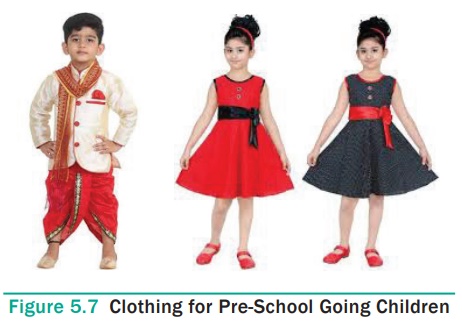
Clothing for School Going Children (5 to 11 Years)
Clothing requirements vary for elementary school children in some
respects than pre-schools although many requirements remain the same. This
period is a very active one physically. Their likes and dislikes about clothing
will develop. Durable clothing must be provided which withstand the strains of
physical activity. Boys enjoy wearing clothes that look rugged, shirt hanging
out; heavy shoes and jeans are often popular. Safety, easy care, growth
allowances and suitability to figure and complexion of child should be
considered while selecting clothes.
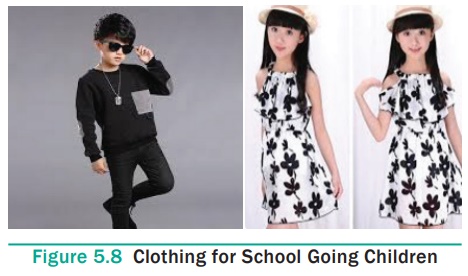
Clothing for Pre-Adolescents (12 to 15 Years)
There will be a rapid change in the body and taking on adult
characteristics during pre-adolescent period. There will be increased interest
in clothes and grooming up. The pre-adolescent is more interested in their
relationship with others. They give more importance to becomingness, price and
beauty than to durability and comfort. Psychological comfort plays an important
role while selecting clothes. Physical comfort is given less importance.
Physical comfort is related with the types of clothing whereas psychological
comfort indicates the satisfaction the wearer.
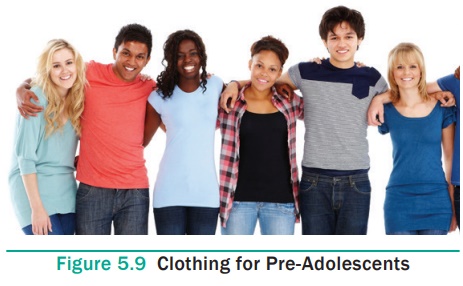
Clothing for Adolescents (15 to 20 Years)
During this period adolescents are learning to manage their body
so they are less awkward. Both sexes seek increased approval from members of
opposite sex. They become more conscious of grooming and personal appearance.
They prefer well fitted, fashionable and expensive garments. Comfort and
serviceability are sacrificed for the sake of style and fashion. Clothing
becomes a means of expressing personality. As adolescents are developing
physically they either want to conceal or show off their figure.
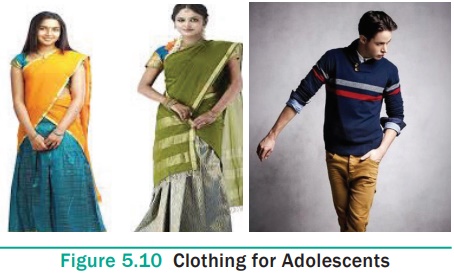
Clothing for Adults
A person is mature enough to select the clothes on the basis of
income, status, occupation, climate, age, sex, occasion, fashion etc. A
well-dressed person feels more confident and more capable of himself. A man’s
wardrobe is different from a woman. Man’s wardrobe includes shirt, trousers,
shorts, socks, ties, shoes, nightwear, suit, etc. Extent of woman’s wardrobe
depends on family income, their social activities, her profession and all other
factors required for men’s clothing. Clothing items depends upon profession of
a person. Working woman needs more clothes as compared to a housewife. Persons
who are socially active need more clothes for formal occasion, for kitty
parties, clubs, marriages etc. Socially active persons are fashion and status
conscious.
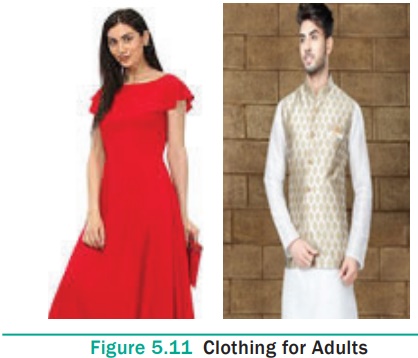
Clothing for Elderly
The bodily characteristics will be changing so it is necessary to
solve the problems of fit and select designs and colours which are becoming to
the age group. The body not only gains in weight after the middle years but the
distribution of weight also shifts. There is general sagging of the body. These
create problems in selection of readymade garments as they are made based on
standard measurements. It is usually found that most of the elderly people
start wearing light coloured clothes. Heavy clothes are also not comfortable
and so they require dresses made of light weight fabrics with enough warmth or
coolness.
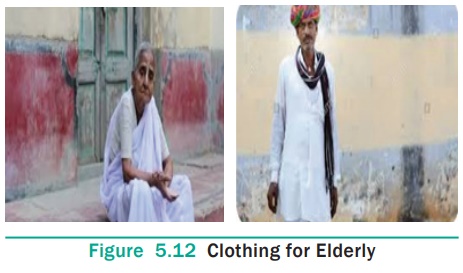
Clothing for Old Age
Old age is the concluding phase of life. Old age brings its own
problems. The body becomes stiff, the eye sight becomes weak and energy level
is considerably reduced. The clothes they wear must be loose and comfortable
rather than fashionable. Dressing and undressing takes more energy than
anything. It is advisable for old age people to have clothes with front opening
with large buttons so that it is easy to use.
In addition many older people are affected with arthritis and
other diseases of joint and muscles which greatly increase the problems. Rough
textures and heavy fabrics may irritate their skin. Their clothing should be
warmer in winters and cooler in summers. As the old age people are less active
physically their clothes do not wear out rapidly.
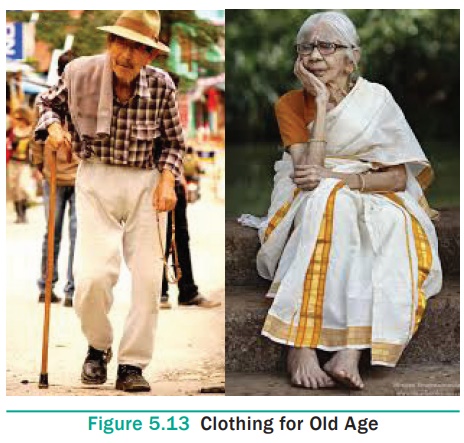
Related Topics